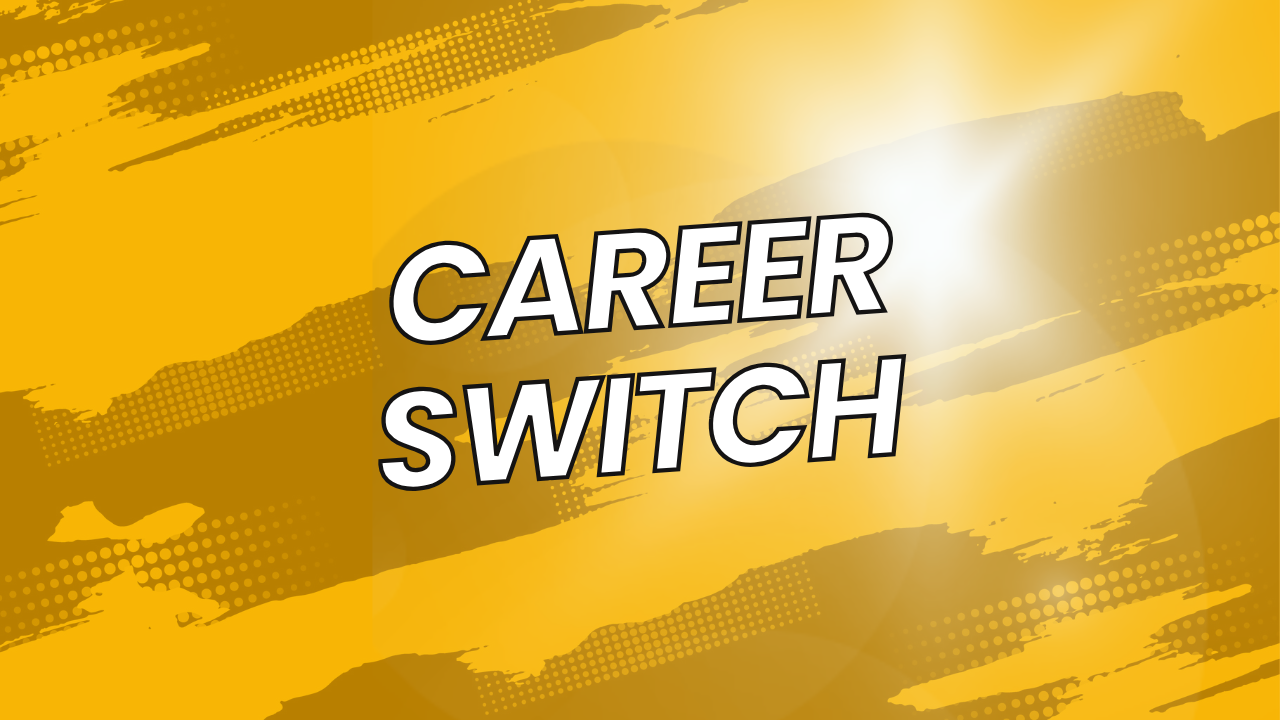Table of Contents
Switching careers can seem like a daunting task, especially if you’re transitioning from one industry to another. Whether you’re seeking new challenges, better work-life balance, or simply a change of scenery, making a successful career transition requires planning, self-assessment, and a willingness to adapt.
In this article, we’ll explore the steps job professionals can take to handle a career change, focusing on strategies to make the transition smoother, build transferable skills, and secure a new role in an unfamiliar industry.
Self-Assessment: Your Why and What You Want
Before diving into the job market, it’s essential to take some time to reflect on your reasons for wanting to switch industries. Self-assessment is a critical first step. This stage will help you understand whether this change is driven by personal growth, dissatisfaction with your current job, or the desire for more work-life balance. It’s important to evaluate your motivations and set clear goals for your future career.
Ask yourself questions like
- What skills do I enjoy using most in my current role?
- What do I want from my new career (e.g., higher salary, flexibility, creative challenges)?
- What industries excite me, and why?
- What aspects of my current job do I dislike, and how can I avoid these in my next role?
In this stage, you also need to define what success looks like to you. Is it finding a role that fits your passions? Achieving a higher income? Or perhaps having more flexibility to spend time with family? Understanding your why will guide your actions throughout the transition.
Identifying Transferable Skills
When switching industries, your prior experience might not seem like it fits the new field at first glance. However, most professionals possess transferable skills that can be applied across different industries. Identifying these skills is key to making your transition easier and demonstrating your value to potential employers.
Some common transferable skills include
- Communication skills: Whether verbal, written, or digital, communication is essential in almost every industry.
- Problem-solving: The ability to address challenges and find solutions is highly valued in all industries.
- Leadership and management: If you’ve led teams or projects, these leadership skills can easily be transferred to new roles.
- Project management: Experience in managing timelines, resources, and stakeholders is valuable in many different settings.
- Analytical thinking: Whether you’re working in marketing, finance, or tech, the ability to analyze data and draw insights is crucial.
- Customer service: Experience in interacting with clients or customers is applicable in fields such as sales, marketing, and hospitality.
When updating your resume or writing your cover letter, emphasize these transferable skills. Highlight specific examples of how you’ve used them to achieve results, even if they come from a different industry.
Research and Learn About the New Industry
The next step in the process is research. Understanding the nuances of the industry you’re moving into is essential for making an informed decision and preparing for interviews.
Start by gathering information about the industry’s trends, challenges, and key players. You can do this by reading industry blogs, following thought leaders on social media, and attending industry-specific webinars or conferences.
Here are some ways to deepen your understanding:
- Online courses and certifications: Take advantage of online platforms such as Coursera, LinkedIn Learning, and edX to learn industry-specific skills. Many of these platforms offer free or affordable courses on a wide range of subjects.
- Networking with industry professionals: Reach out to people working in the industry you’re targeting. LinkedIn is a great platform for connecting with professionals who can share valuable insights about their work and provide guidance on your transition.
- Industry publications and reports: Subscribe to industry newsletters or read publications like Forbes, Harvard Business Review, or other specialized journals to stay up-to-date.
- Industry-specific job boards: Explore websites like Indeed, Glassdoor, or niche job boards specific to the industry you’re entering. These will help you understand the types of jobs available and the skills employers are seeking.
By immersing yourself in the industry, you can become familiar with its language, trends, and challenges, making you more marketable when it comes time to apply for jobs.
Networking and Building New Connections
Networking is an invaluable tool when transitioning to a new industry. Building relationships with professionals already working in the industry you want to join can open doors and provide insider knowledge. Networking allows you to hear about job openings that may not be posted publicly and gain advice on making the transition successfully.
Here are some networking strategies
- Informational interviews: Reach out to people in the industry and ask if they’d be willing to share their experiences and offer advice. Be prepared with thoughtful questions and a brief introduction about your career goals.
- Attend industry events: Many industries host conferences, trade shows, and workshops that are great for meeting people and learning about the latest trends. Look for virtual events as well if you’re unable to attend in person.
- Use LinkedIn effectively: LinkedIn is an excellent tool for networking with industry professionals. Join relevant groups, participate in discussions, and make sure your profile reflects your career aspirations.
- Join industry-specific groups or forums: Online communities, forums, or groups on platforms like Facebook, Reddit, and Meetup can connect you with people who share your career interests.
Networking is about relationship-building rather than just job-hunting. Be genuine, offer value, and express your desire to learn from others. The more people you connect with, the more you’ll hear about opportunities and trends in the industry.
Gaining Relevant Experience
Sometimes, you may need to gain some relevant experience before making the full switch. This doesn’t mean starting over from scratch, but rather gaining exposure to the new field through small steps. Some ways to gain relevant experience include:
- Freelancing or consulting: If possible, offer your services as a freelancer or consultant in the new industry. This is a great way to build a portfolio, gain hands-on experience, and expand your professional network.
- Internships: If you’re switching to an entirely new field, taking an internship – even if you’re a seasoned professional – can help you gain credibility and learn about the industry’s specific needs.
- Volunteer work: Volunteering in the new field, even on a part-time basis, can help you develop valuable connections and gain experience in the field without a full-time commitment.
- Side projects: Start a side project or business related to the industry you want to move into. It could be something as simple as blogging, creating a podcast, or designing a product. This shows potential employers that you’re proactive and committed.
By gaining hands-on experience, you’ll make the transition smoother and improve your confidence.
Revamp Your Resume and LinkedIn Profile
Once you’ve identified your transferable skills, gained some relevant experience, and learned more about the industry, it’s time to update your resume and LinkedIn profile. Make sure they reflect the skills and experiences that are most relevant to the new field.
Here’s how to customize your resume and LinkedIn profile:
- Highlight transferable skills: Even if your work experience is from a different industry, emphasize the skills you’ve gained that are applicable to your new field.
- Use industry-specific keywords: Make sure your resume and LinkedIn profile include the right keywords to pass through applicant tracking systems (ATS). Refer to job descriptions in your new industry to identify these keywords.
- Show your commitment to the change: Demonstrate your dedication to the transition by listing any relevant courses, certifications, and projects that align with your new career goals.
- Emphasize soft skills: Soft skills like adaptability, communication, and teamwork are highly valued across industries and should be prominently featured in your resume.
Consider working with a professional resume writer if you’re struggling to present your experience in a way that resonates with employers in the new industry.
Apply for Jobs Strategically
When you’re ready to start applying for jobs, be strategic. Don’t just apply to every job you see. Focus on roles that leverage your transferable skills and experience, and where you believe you can quickly add value. Be realistic about entry-level positions, especially if you’re entering a completely new field, but don’t sell yourself short either.
- Focus on smaller companies: Smaller companies may be more willing to take a chance on someone transitioning from a different industry.
- Be open to entry-level positions: Depending on your new industry, you might need to take a step down in title or salary to gain experience. Consider this an investment in your long-term career success.
- Use your network: Apply for roles you’ve found through networking or informational interviews. These opportunities often come with a built-in level of trust, making your transition smoother.
Prepare for Interviews
In interviews, be prepared to discuss why you’re making the switch and how your skills align with the new industry. Employers may have concerns about your lack of direct experience, so it’s important to highlight your transferable skills and your passion for the industry.
Tips for a successful interview:
- Focus on your adaptability: Emphasize your ability to learn quickly and apply past experiences in new settings.
- Discuss your motivation: Share your enthusiasm for making the transition and how the new role aligns with your long-term career goals.
- Provide examples: Use specific examples from your past experience to demonstrate how your skills and achievements are transferable.
Stay Persistent and Patient
Industry transitions can take time, especially if you’re making a significant leap. Be patient with yourself throughout the process. Stay persistent in applying for roles, networking, and gaining new experiences. If things don’t work out immediately, don’t get discouraged. Every step you take is moving you closer to your goal.
Our Recommendation
Transitioning from one industry to another is a big decision, but with the right approach, it’s entirely achievable.
By conducting a thorough self-assessment, identifying transferable skills, gaining industry knowledge, networking, and strategically applying for jobs, you can successfully handle a career change. It takes patience, dedication, and a willingness to learn, but the result will be a more fulfilling and rewarding career in a new field.
Frequently Asked Questions
Start by analyzing your current skills and comparing them to the requirements of your target industry. Focus on soft skills (communication, leadership, problem-solving) and technical skills that apply across industries.
Not always. Many industries value experience, certifications, or online courses over a full degree. Research job descriptions to determine if formal education is necessary or if upskilling through workshops, bootcamps, or self-learning is sufficient.
Consider freelance work, volunteering, internships, or side projects to gain relevant experience. Networking and informational interviews can also open doors to entry-level roles or apprenticeships.
Join industry-specific LinkedIn groups, attend conferences, and connect with professionals through networking events. Informational interviews with people in your target industry can provide insights and potential job leads.
Highlight transferable skills, relevant certifications, and projects that demonstrate your ability to adapt. Use industry-specific keywords from job descriptions and write a compelling career summary explaining your transition.

Shridhar is a passionate career coach and expert writer with a focus on professional growth, job search strategies, and personal development. With years of experience in the corporate world, Shridhar understands the challenges professionals face in advancing their careers.


